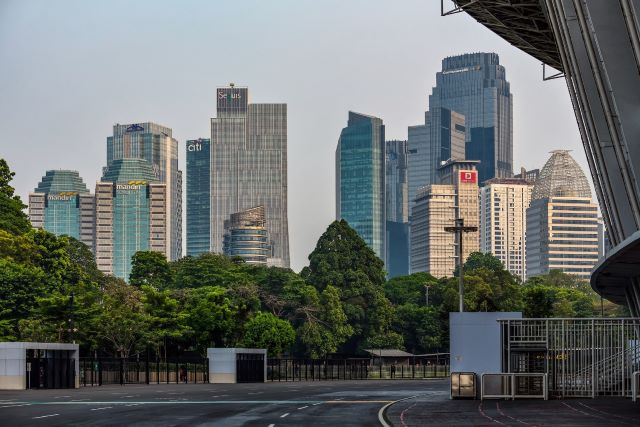Popular Reads
Top Results
Can't find what you're looking for?
View all search resultsPopular Reads
Top Results
Can't find what you're looking for?
View all search results‘Danantara effect’ risks creating a mirage of economic salvation
Change text size
Gift Premium Articles
to Anyone
S
ince its launch, Indonesia’s newly established sovereign wealth fund, Danantara, has captured national imagination with promises so grand that they border on the unbelievable. Heralded as one of the world’s largest sovereign wealth funds and positioned as the engine of a sweeping economic revolution, Danantara’s narrative has inflated expectations to levels that may ultimately prove impossible to meet.
From the outset, Danantara has been wrapped in political messaging and sweeping statements from ministries and government agencies, casting it as the key financier for a wide array of national projects. What began as cautious optimism has quickly evolved into a widespread public assumption that Danantara will underwrite Indonesia’s major development ambitions, from the new capital city project in Kalimantan, Nusantara (IKN), to the revival of struggling state-owned enterprises such as Garuda Indonesia.
This phenomenon, now colloquially referred to as the "Danantara effect," reflects a dangerous overreliance on the fund. Many, including policy analysts and academics, have suggested that the government could scale back investment allocations from the state budget, assuming Danantara will seamlessly shoulder the burden. However, this assumption misreads Danantara’s original mandate: to be a highly selective and strategic investor, not a catch-all financial backstop.
The government’s own promotional efforts have only fueled confusion. Claims that Danantara ranks among the largest sovereign wealth funds globally have raised expectations to unrealistic heights, even as questions persist regarding the fund’s actual financial capacity.
Indonesia’s current economic climate has amplified the Danantara effect. With the country emerging as Asia’s worst-performing market so far this year, investors are desperate for signs of stability. The IDX Composite fell to its lowest level of the year at 5,968 points on April 9, while the rupiah briefly touched Rp 17,000 per US dollar amid persistent depreciation. Against this backdrop, Danantara has been portrayed as a stabilizing force, with Chief Investment Officer Pandu Sjahrir confirming that part of its April dividend inflows will be used to support domestic equities.
Yet the foundations of Danantara’s financial strength are not as solid as public perception suggests. While the fund is projected to manage an asset base of Rp 14.8 quadrillion (US$900 billion), much of this figure is made up of illiquid state equity holdings. Dividends from state-owned enterprises (SOEs), Danantara’s primary source of liquid assets, are limited. Between 2020 and 2024, the government received just Rp 26.7 trillion (US$ 1.6 billion) in net dividends after deducting massive capital injections.
Moreover, the promised US$20 billion capital injection from the government remains uncertain, with indications that disbursement will be staged until 2029. This leaves Danantara in a precarious position, reliant on modest dividend payouts and saddled with financially struggling SOEs, including debt-laden construction firms, money-losing pharmaceutical firms and the troubled flag carrier Garuda Indonesia.
Leadership concerns further cloud the fund’s outlook. Despite Danantara’s CEO Rosan Roeslani’s assertion that no executive should hold double roles, he himself continues to serve as Minister of Investment and Downstream Industry. Allegations of political loyalty influencing key appointments have raised doubts about whether Danantara can resist political pressure and maintain its stated commitment to sound investment principles.
Danantara has laid out clear investment priorities, focusing on sectors such as mineral downstreaming, manufacturing (including electric vehicles), digital infrastructure, food security and energy. It has also imposed seven strict investment criteria, ranging from job creation and global competitiveness to national security contributions and strong returns on investment.
However, whether the fund can adhere to these principles in practice remains to be seen. Given the politicized nature of its leadership and the powerful "Danantara effect" shaping public and political expectations, the risk is that the fund could be forced to finance politically driven projects rather than making strategic, high-return investments.
Should that happen, the repercussions could be severe. Investor confidence, both domestic and international, could erode, deterring future partnerships and undermining Danantara’s credibility. Stretching the fund’s mandate to support failing enterprises could also strain its limited financial base, which depends heavily on SOE dividends. Without a buffer, Danantara may be unable to fulfill even its own strategic agenda, potentially turning it from a sovereign asset into a long-term fiscal liability.
To guard against such risks, the amended SOE Law No. 1/2025 mandates a Supervisory Board, comprising the SOEs minister and independent auditors, to approve Danantara’s annual budget and work plan. The law also requires a clear separation between the fund’s leadership, its supervisory board and the leaders of the investment holding units it oversees, aiming to curb political interference.
Still, investors are calling for more. Above all, they want transparency, predictability and regular public disclosure. To build trust, Danantara is urged to institutionalize reporting cycles and publish detailed investment rationales and performance outcomes. These reports should go beyond surface-level summaries, instead linking investment decisions to the fund’s seven criteria and offering clear metrics on project selection and results. Investors also seek clear signs of serious efforts to curb corruption, enhance rule of law and embed meritocracy within Danantara’s governance.
Danantara now stands at a crossroads, it can emerge as a disciplined, transformative force in Indonesia’s economic landscape, or become a symbol of misplaced hope, overwhelmed by impossible expectations it was never designed to meet. The direction it takes will shape not only its own legacy but the country’s broader investment future.











